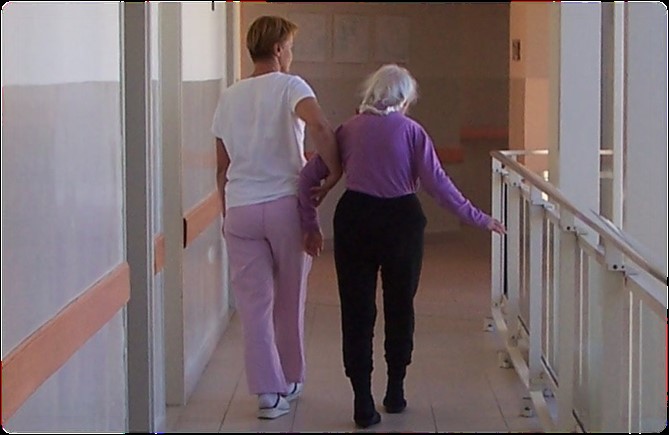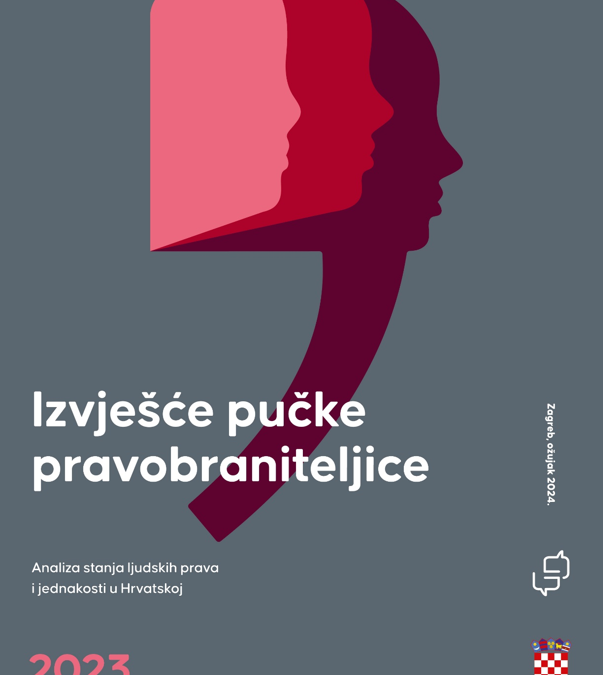On March 29th, Ombudswoman Tena Šimonović Einwalter submitted a new annual report to the Croatian Parliament. The Ombudswoman’s report for 2023 provides an analysis and assessment of the human rights situation in Croatia, as well as 147 recommendations.
Citizens’ complaints pertaining to various areas of life reflect some similar problems in the actions of various public authorities, such as failing to inform citizens about their rights and how to exercise them and failing to sufficiently apply the principle of assisting the parties in the proceedings. Furthermore, their communication with citizens was not always timely and of good quality. All of these represent obstacles to the exercise of the right to good governance, contributing to distrust in the institutions.
Last year, citizens addressed the Ombudswoman most commonly due to problems with realizing the right to health, followed by discrimination in various areas of life and violations of the right to work.
Complaints related to the right to health showed that healthcare services were difficult to access, there was a lack of doctors and medical teams, and patients often did not receive complete information. Residents of remote areas and islands expressed fear of losing their only doctor, oncology patients faced waiting lists and malfunctioning diagnostic equipment, while palliative care patients often did not receive dignified end-of-life care. Complaints came from people with severe and/or chronic illnesses and in poor financial situations, mothers receiving maternity/parental support, and students studying outside Croatia who lost compulsory health insurance after the obligation of regular personal visits to Croatian Health Insurance Fund was introduced.
The largest number of discrimination complaints related to the area of work and employment, with the most frequent grounds cited being racial or ethnic/national origin, with Roma being the most exposed. A significant number of discrimination cases remain unreported, indicating the need to raise awareness of the prohibition of discrimination and to strengthen the protection mechanisms. One of the means to achieve this is performing analyses of judicial practice, which is also part of the Ombudswoman’s 2023 Report.
Complaints related to the right to work included, among other, illegal dismissals, undeclared work, non-payment of wages or partial payment “off the books,” and workplace harassment (bullying). Necessary changes to the Act on Foreigners have not been made to make it easier for foreign workers to decide to report violations of their rights, to enable language learning on a national level, and to regulate accommodation conditions.
Affordable housing was not sufficiently accessible to citizens, while social housing is underdeveloped, requiring the establishment of housing policies and provision of social housing to protect the right to adequate housing. Reconstruction after the earthquake has accelerated, but many citizens are still waiting for their homes to be renovated.
The social welfare system needs to be more efficient – well-organized, user-focused, with appropriate capacities, accessible to all, and benefits should ensure a significant reduction in poverty. Social workers have reported being overwhelmed by administration even after the system’s reorganization, stating they “see paperwork, not people.” Homeless individuals face numerous rights violations, are often ‘invisible’ and stigmatized, and are not covered by systematic measures and policies.
More and more elderly people are at risk of poverty (34.8%), especially those living alone (59.9%). New mechanisms have been introduced to protect against abuses of life-long care contracts, including those based on the Ombudswoman’s recommendations. However, there has not been enough progress in preventing and combating violence against older people. Complaints and inspections of nursing homes indicated inadequate accommodation conditions and treatment of residents, partly due to staff shortages, but also due to a lack of awareness of the dignity and rights of older people.
Regarding the freedom of expression, the level of political communication in 2023 was still subpar, which the Ombudswoman highlighted ahead of the parliamentary elections. This trend normalizes unacceptable communication among citizens, with particular issues being intolerance and hate speech online. Journalists faced SLAPP lawsuits, attacks, and threats. The announcement of amendments to the Criminal Code was also a cause for concern, and it is important to monitor whether and how the new criminal offense will affect media freedoms.
Unfortunately, the Croatian Parliament has still not discussed the Ombudswoman’s previous report, continuing the trend of tardiness in their deliberations, which also affects the implementation of the recommendations – although Croatian Constitution designates the Ombudswoman as the commissioner of the Croatian Parliament for the promotion and protection of human rights and freedoms, independent and autonomous in her work.
According to the Ombudsman Act, the annual report is submitted by the end of March, which this year coincides with the dissolution of the Croatian Parliament and the calling of the parliamentary elections.
In line with her role of an independent, autonomous, and impartial institution, the Ombudswoman will not publicly address the matter until the end of the parliamentary elections. To emphasize the need for timely discussions on the report in the Croatian Parliament in the future, the Ombudswoman will present this Report to the public at a press conference after the new Parliament is constituted.
Additional information:
You can download the Ombudswoman’s 2023 Annual Report here
In addition to the issues listed above, the Report covers numerous other topics, areas, and rights – youth, energy poverty, the protection of whistleblowers, the right to public assembly, the right to water, the right to clean, healthy, and sustainable environment, the rights related to the police system, asylum seekers and irregular migrants, the prison system, artificial intelligence, as well as the field of justice, including digitization, enforcement, hate crimes, free legal aid, support to victims and witnesses, among many others.
 Ombudswoman Submits Report 2023 Annual Report to the Croatian Parliament
Ombudswoman Submits Report 2023 Annual Report to the Croatian Parliament The Importance and Impact of Political Discourse in the Pre-Election Period
The Importance and Impact of Political Discourse in the Pre-Election Period International Conference Marks End of the Project on the EU Charter on Fundamental Rights and the Rule of Law
International Conference Marks End of the Project on the EU Charter on Fundamental Rights and the Rule of Law Parliamentary Committee on Human and National Minority Rights Votes in Favor of the Ombudswoman’s 2022 Annual Report
Parliamentary Committee on Human and National Minority Rights Votes in Favor of the Ombudswoman’s 2022 Annual Report World Homeless Day – Invisible, but also Forgotten?
World Homeless Day – Invisible, but also Forgotten? Ombudswoman to Issue Special Report on the Human Rights of Older Persons
Ombudswoman to Issue Special Report on the Human Rights of Older Persons


